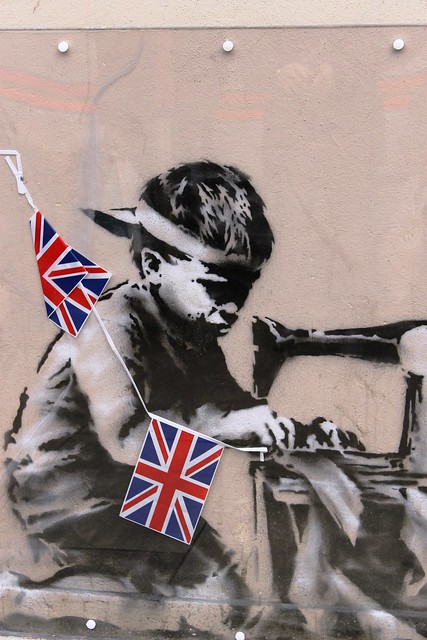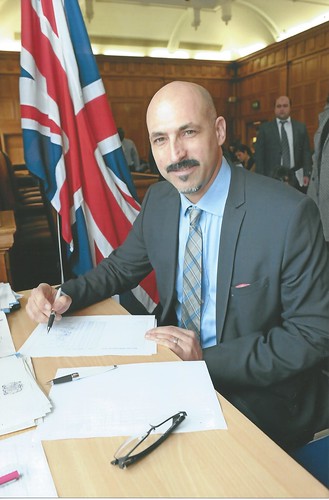As you know, I became British recently. You now have a population of 63M + 1.
I’m still working out what being British means, but based on my observations as an immigrant the last several years there’s a lot of scope for self-referential commentary and a bit of naval-gazing here.
These are some of my impressions, so far.
Britain at its best
The first thing to say is that you are complicated. Now, it won’t surprise you that as an American I would find you or any other culture complicated. But it’s true.
On one hand you are totally brilliant and creative and funny and sensible and worldly, and then on the other you are petty and embarrassed and cranky and ironically hypocritical.
Let’s start with your brilliance because when you get it right, you get it really right.
Your success as an entertainer is pheonomenal.
You give the world some of the strongest and most powerful actors. Your artists and writers have a great balance of attitude with insight. Of course, you already know that your humor is unparalleled, a cultural attribute worth marveling.

And your music…how do you do it? And keep on doing it? The music you give the world consistently punches above your weight.
I sometimes worry you’re being a bit too cavalier with your position in the popular music world, though.
Yeah, it’s very entertaining watching talent shows where the judges say out loud the horrible things that you’re thinking in your head, but it’s not helpful to those performing and doesn’t yield good music. It’s shallow, mean-spirited, and keeps true creativity reigned in.
You are an ingenious inventor.
You gave the world hugely important tools and technologies like the pencil, the radio, typewriters, carbon fiber, silicone, steam engines, jet engines, submarines. You discovered invisible worlds like cell biology and calculus.
Everyone forgives you for polyester, which, not surprisingly, was actually popularized by an American you love nearly as much as we do – Elvis.
You invented practically every professional sport. Strangely, you’re rarely the best at any of them. *
That fact is very interesting to me because it doesn’t seem like an isolated trait. It’s something every Brit is aware of and just accepts as truth, like some maligned strand in the British cultural DNA.
This is precisely where I find it harder to relate, because it doesn’t have to be true.
Backseat driver
I think maybe you don’t want to be responsible or accountable for anything you might not win. You’d prefer to observe, analyze and then criticize those who make mistakes.
When things go wrong you can legitimately say, “I told you so”, because you eagerly reported all the many ways it was going to fail. One of them was going to be right.
For example, instead of following through on the English republic, a somewhat more controlled democracy seemed preferrable to all-out people-powered rule. I won’t pretend to understand everything that happened during that period, but ultimately you voluntarily revoked your own independence and invited the monarchy back.
And to this day you still pass the Commander-in-chief role through family lines rather than democratically elected officials, and you govern through appointed Lords who keep your people’s representatives in check.

I’m not arguing the British governing system is broken or wrong — we all know America’s form of democracy has plenty of challenges, too — but rather that these choices define you and demonstrate what matters to you as a society. In some ways it feels like you’re in denial about who is in charge here.
On the other hand your creativity in both foreign affairs and domestic policy are profound and forward-thinking.
Perhaps the first ever manifestation of a concept of freedom of speech in the world appeared as a result of the end of the republic in your 1689 Bill of Rights. You thought people should be able to petition the monarch without fear of retribution.**
That was surely revolutionary at the time and remains a core tenant of democratic values today.
It seems to me that your commitment to that premise is on shakey ground at the moment, as your politicians are challenging free speech in many worrying ways. But you’ll get past this episode, as it clearly matters deeply to you.
Later you invented the World Wide Web, the most profound open market for free speech the world has ever known. ***
Again, like many others before it, your role in your invention’s life was a strange one.
First, you watched from the sidelines while US entrepreneurs created massive commercial institutions off the back of it.
And then when you realized the Web mattered to the world so much you used it to monitor conversations instead of protecting its meaning and its existence as a public space.
The inventor of fingerprinting, iris scanning, and DNA databases, unsurprisingly, turned the great communications channel of the world into a weapon against your own allies by literally tapping into the information flow going through it.
Knowledge is power. It didn’t surprise me to learn recently that you coined that term.
The cancer of self-doubt
It’s not your sophisticated and sometimes dangerous information machines that are the problem but rather your lack of faith in yourself as a positive contributor in the world that is going to do the most damage over time.
That fundamentally British cynicism can become a sort of infectious disease within your culture. It can destroy some of your greatest capabilities…creativity chief among them.
As much as I value the grounded way in which you view yourself, I think you are too cynical.
You refuse to let yourself believe that you are actually good at anything unless you are definitively the best at it. You can’t seem to see or imagine the sky beyond the heavy clouds that rain on you all the time.
The London Olympics were absolutely wonderful, and yet a year after you were still debating whether or not it was a success.
It was a huge success!
In fact, it was the London Olympics and the brilliant opening ceremony that first inspired me to make my naturalisation happen. It thrust the country onto the world’s stage in a big way, and I know I wasn’t the alone in my admiration for you.

Why can’t you pat yourself on the back, Britain? Is the system more important to you than the individual?
That could explain the great English superhero James Bond. Yes, he is a talented man, but his abilities are amplified by the secret intelligence machine behind him, an invisible hand that provides for his lifestyle and is always prepared to catch him when he flies too close to the sun. His super power is actually the government and country. (…a force that is prepared to dispose of him, too.)
Often that collective spirit is a huge plus.
Instead of operating without a leader in 2010 when you couldn’t choose a party to run the government, you joined up two parties to run it together. As much as the politicians are clearly annoyed with it, the model is very sensible and grown up.
My American countrymen seem incapable of collaborating with oppositional forces at all. There has to be a winning team and a losing team, even if that results in a worse outcome than both sides giving up a little for the good of all.
It’s likely that some of your many talents result from the struggle against the institutional powers that work so hard to maintain the social net and the status quo.
Great art often arises out of conflict, and the struggle against immovable forces may just be what makes Britain so British.
The British pride contagion
My first draft of this letter included some things I think should change, but, on reflection, that seemed too, well, American. Instead I’ll adopt my new culture, accept us the way we are, and continue to study what it means to be British until it’s clearer where I can have a meaningful impact.
To be clear, I’m very proud to be a dual citizen. The naturalisation ceremony hammered that home. It’s also true that your quirks have really grown on me.
My favorite is how you queue everywhere, whenever possible, as if the future of the human race depended on it. It makes me laugh, but I also get it.
I’ve become very proud that my children are British. I love to see my American friends and family react when they hear their accents.
I love that we can expose them to foreign people and languages both via our home city in London and with cheap holidays to foreign countries.
I love the newspapers here, particularly the Guardian, of course. The BBC is brilliant.
London is one of the truly great cities in the world. Dorset, Norfolk, and Sussex have all treated us very well on our travels.
I’ve learned to really enjoy football here, though the Premier League shenanigans can make that a difficult relationship, as I think most people here feel, as well.
And my friends and colleagues here, and the kids’ school are all brilliant.
I look forward to voting and becoming a more active member of your society.
I’m proud to live here, warts and all. It wouldn’t be home any other way.
* Britain’s Olympic medal count over time and in London, in particular, shows that athletic capability is stronger than you might think. Maybe I’m being unfair in my criticism here and in fact Britain dramatically outperforms relative to its size. That wouldn’t be surprising.
** Going a step further and calling for the abolition of the monarch carries a life sentence even still today.
*** While, technically, it was a subset of the Internet which had been around for years, the World Wide Web was the best solution for publishing open and connected public documents and thereby the key to unlocking the Internet as a free speech engine.






